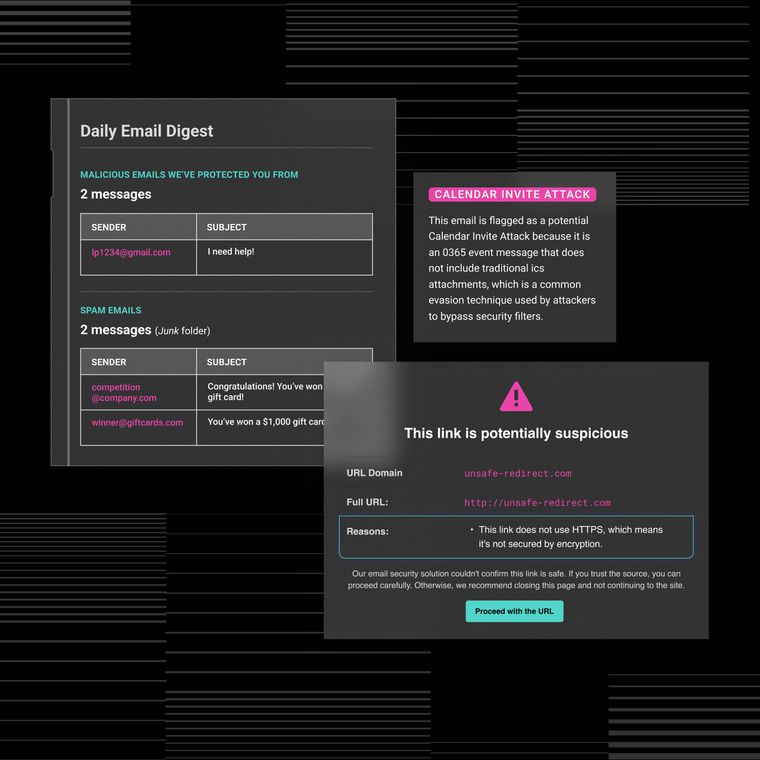Email Security for Retail: 7 Ways to Use AI to Protect Your Business
Email security for retail leverages AI to protect transactions, customer data, and brand trust from email threats.
August 18, 2025
In January 2023, Forever 21 disclosed a cyberattack that compromised the personal data of over 539,000 individuals, including names, dates of birth, bank account numbers, Social Security numbers, and employee health plan information. The incident, which persisted undetected for three months, illustrates how quickly attackers can penetrate retail systems and the severe consequences that follow.
More recently, in May 2025, Marks & Spencer entered its second week of halted online orders after a major cyberattack, erasing £700 million in market value. The retailer confirmed hackers stole customer data, while Harrods also faced breaches, prompting the UK’s National Cyber Security Centre to call it a wake-up call for retail security.
These incidents are indicators of how when accounts are compromised in the retail sector, the impact extends far beyond data loss. That said, artificial intelligence now offers a decisive advantage in preventing such incidents. AI-powered email security solutions enable retailers to protect sensitive data, preserve operational continuity, and maintain customer confidence. This article outlines seven practical ways to leverage AI to strengthen email security in the retail sector.
Why Email Security Matters in Retail
Email security matters in retail because organizations face unique challenges that directly impact revenue generation, regulatory compliance, and brand reputation. Email serves as the primary communication channel for order processing, customer service, vendor coordination, and marketing campaigns, making these systems attractive targets for sophisticated attacks.
Email compromise disrupts core retail functions through multiple attack vectors. Fraudulent order confirmations confuse customers and overwhelm support teams. Hijacked vendor communications, redirect payments, and disrupt supply chains. Compromised marketing accounts send malicious links to customer databases, destroying sender reputation and deliverability rates that take months to rebuild.
Additionally, business email compromise attacks targeting retail prove to be particularly damaging because they exploit trusted business relationships and financial approval workflows. When attackers successfully impersonate suppliers or executives, the resulting financial losses often exceed ransom demands while creating lasting damage to vendor relationships and operational continuity.
What Makes Retail a Target
The combination of high-value data processing, complex vendor networks, and operational tempo creates optimal conditions for successful attacks across the retail industry. Here are some of the reasons in detail:
High-Value Data and Immediate Monetization
Retail operations process data that provides immediate value to cybercriminals. Payment card numbers enable direct financial fraud. Customer contact details fuel identity theft operations. Loyalty program balances can be quickly monetized through fraudulent transactions.
Administrative credentials for e-commerce platforms and point-of-sale systems unlock entire operational environments, enabling attackers to modify payment settings, access customer databases, or manipulate inventory systems.
Complex Vendor Ecosystems and Supply Chain Vulnerabilities
Retail data flows through extensive vendor networks, including point-of-sale providers, e-commerce platforms, logistics carriers, and marketing agencies. Each relationship involves routine email exchanges that attackers systematically exploit for supply chain attacks.
Compromised marketing vendors can impersonate brand communications, while hijacked logistics partners can redirect shipments or steal delivery data. Attackers increasingly target the weakest security implementations in supplier networks rather than attacking well-defended primary targets directly.
Operational Pressures and Workforce Vulnerabilities
Retail environments process thousands of purchase orders, return authorizations, and promotional approvals daily. This communication volume creates noise that obscures anomalous requests, particularly during high-pressure periods like holiday sales peaks.
Seasonal hiring patterns and franchise business models mean many users access email from personal devices, often before completing comprehensive security training. High employee turnover creates persistent knowledge gaps that attackers exploit through social engineering campaigns targeting inexperienced staff.
Technology Infrastructure Complexity
Retail organizations operate diverse technology environments spanning physical stores, e-commerce platforms, warehouse management systems, and corporate headquarters. This distributed infrastructure creates numerous entry points where weak security implementations can compromise entire networks.
Franchise models introduce additional complexity through inconsistent security policies across locations. Attackers systematically identify the weakest security implementations within retail chains, establishing footholds that enable lateral movement toward high-value targets.
Why Traditional Defenses Fall Short
Static, rule-based email filters cannot adapt to the sophisticated, socially engineered threats that systematically target retail operations. These legacy systems evaluate technical indicators while missing the behavioral context that characterizes modern attack methods.
Traditional secure email gateways scan for malware signatures, suspicious attachments, and known malicious domains, but they often miss sophisticated vendor email compromise attempts. When attackers spoof legitimate suppliers requesting banking detail updates, gateway systems often see technically clean messages and approve delivery.
Modern business email compromise attacks frequently operate within legitimate conversation threads, making detection extremely difficult for traditional systems. Attackers monitor ongoing invoice discussions for weeks before injecting fraudulent payment redirections that appear entirely legitimate within established communication patterns.
7 Ways to Use AI to Protect Your Retail Business
AI transforms retail email security by learning communication patterns, implementing zero-trust evaluation, and automatically responding to sophisticated attacks. These seven capabilities strengthen defenses while maintaining operational efficiency during peak retail periods.
1. Implement Behavioral Pattern Analysis to Prevent BEC and Vendor Fraud
Behavioral AI maps normal communication behaviors across organizations, analyzing who contacts whom, message frequency patterns, and communication tone characteristics. When vendors suddenly modify banking details or managers request urgent gift card purchases outside normal hours, behavioral deviations trigger immediate quarantine procedures.
This behavior-first approach proves critical because business email compromise attacks rarely contain malicious links or attachments that signature-based filters detect. Recent retail breaches demonstrate how attackers hijack legitimate conversation threads to redirect payments, completely bypassing traditional security controls through sophisticated social engineering.
2. Deploy Zero-Trust Email Risk Assessment
Zero-trust security principles treat every message as potentially malicious regardless of apparent origin. AI combines identity signals, including login locations and device fingerprints, with the relationship history and threat intelligence to assign dynamic risk scores to each communication.
Messages exceeding defined risk thresholds automatically trigger step-up verification procedures or quarantine protocols. Retail's distributed workforce—spanning store tablets, warehouse systems, and franchisee devices—creates numerous internal spoofing opportunities that zero-trust policies systematically address without disrupting legitimate business communications.
3. Detect AI-Generated and Advanced Phishing Techniques
Generative AI enables attackers to craft perfect communications, embed malicious QR codes, and eliminate suspicious links while relying on urgency and social engineering for success. Machine learning models analyze linguistic patterns, sentiment indicators, and micro-inconsistencies to identify synthetic content even when URLs appear completely legitimate.
Recent email service provider compromises demonstrate how attackers send convincing phishing messages containing no obvious technical indicators. Natural language processing detection capabilities identify these sophisticated attempts before seasonal staff or pressured managers can respond to fraudulent requests.
4. Enable Automated Incident Response and Security Triage
High-volume retail environments generate more security alerts than lean teams can effectively process. AI automatically clusters related security events, enriches alerts with forensic context, and generates investigation summaries for rapid analyst review. When coordinated attacks affect thousands of mailboxes, systems automatically remove matching threats and close incidents without manual intervention.
This automated response capability reduces containment time from hours to minutes, proving critical when holiday sales periods or promotional campaigns spike email traffic and create intense operational pressure that could delay manual remediation efforts.
5. Implement Advanced Attachment Analysis and Sandboxing
Procurement teams routinely exchange countless PDF documents, including vendor catalogs, pricing sheets, and shipping documentation. AI-powered sandboxing systems execute each file attachment in isolated virtual environments, monitoring for suspicious behaviors like hidden macros or unauthorized network connections.
The clean files are automatically rebuilt without executable content, while weaponized documents remain quarantined with detailed analysis reports. This prevents malicious invoices from compromising workstations and potentially enabling lateral movement into point-of-sale networks, which is a common attack progression in retail security incidents.
6. Deploy Personalized Security Training with Behavioral Intelligence
Generic security awareness training programs prove ineffective for frontline retail workers with varying schedules and technical backgrounds. AI analyzes individual user behaviors to deliver targeted micro-training modules: store managers practice identifying gift card scams while payroll teams learn to recognize fraudulent banking modifications.
Mobile-optimized, role-specific training maintains engagement without disrupting shift operations. Repeated exposure to personalized threat simulations dramatically reduces click rates on actual phishing attempts, transforming employees from potential security liabilities into active defenders against sophisticated attacks.
7. Optimize Email Authentication Policies with AI Assistance
Strict SPF, DKIM, and DMARC policies prevent brand spoofing attempts, but implementing comprehensive authentication across multiple email service providers often disrupts legitimate communications. AI systems inventory authorized senders, identify authentication gaps, and stage policy modifications to migrate safely from monitoring to enforcement without affecting order confirmations or marketing campaigns.
Recent email service provider breaches highlighted how attackers exploit weak authentication implementations to send phishing messages from trusted domains. Automated policy optimization eliminates these vulnerabilities while preserving sender reputation during critical sales periods when communication reliability directly impacts revenue generation.
How Abnormal Supports Retail Teams
Retail organizations operate in fast-paced environments where email security failures can immediately impact revenue generation, customer relationships, and regulatory compliance. Abnormal's behavioral AI platform addresses the industry's unique challenges by automatically learning communication patterns and protecting against sophisticated threats without disrupting high-volume operations.
The platform connects through API integration with Microsoft 365 and Google Workspace, analyzing thousands of signal, including login telemetry, message frequency, communication tone, and historical sender patterns. When threat actors spoof suppliers, request urgent gift card purchases, or modify banking details, Abnormal automatically flags behavioral anomalies and removes malicious messages before staff can respond.
Securing Retail Operations with AI-Powered Email Defense
Domino's, serving over one million customers daily across 90+ countries, struggled with advanced spear phishing and business email compromise attacks bypassing their secure email gateway. Their six-person security team was overwhelmed, investigating 500 potentially malicious email tickets daily while AI-generated attacks exceeded human detection capabilities.
After implementing Abnormal's behavioral AI solution, Domino's achieved a 98% reduction in user-reported malicious emails and detected 355% more BEC attacks compared to industry averages. The solution saves analysts 41 hours daily on manual investigations, allowing the team to focus on critical security projects.
Email Productivity testing identified 488 hours of potential companywide time savings in 30 days through graymail filtering. "Abnormal has really helped reduce the potential for compromises caused by human behavior," said Jonas Turner, Manager of Engineering, Information Security.
Like Domino’s, other retail leaders across the industry already trust Abnormal's protection against email threats that specifically target revenue operations and customer relationships. Want to see how Abnormal can secure your retail communications? Explore our customer stories and request a demo to see retail-tailored solutions in action.
Related Posts
Get the Latest Email Security Insights
Subscribe to our newsletter to receive updates on the latest attacks and new trends in the email threat landscape.


